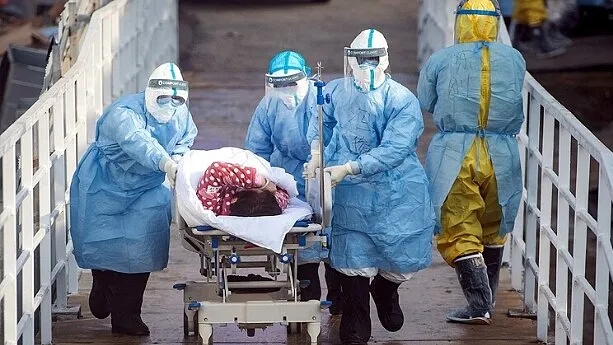
COVID-19: A Tragedy Without Villains
It was the height of irony that Oscar honours were showered upon ‘Parasite’, described by its creator as “a comedy without clowns, a tragedy without villains”, even as a tragedy without villains was unfolding in China in the form of the coronavirus. The interaction between two families at the two ends of the financial spectrum dramatically and realistically told by a South Korean moviemaker created history by winning recognition in Hollywood, days before a blanket of secrecy and horror enveloped China, with the possibility of the world looking with suspicion at the whole orient. As the pandemic, now rechristened as COVID-19 began to take a heavy toll on Chinese lives and the regime resorted to measures of desperation, the search has started for a villain.
First, it was a rumour that the virus was released accidentally by a laboratory, which was experimenting with a possible biological weapon, which was later mentioned as a possibility by responsible American agencies. Biological weapons of all kinds have been banned, but given China’s reputation for chasing weapons of mass destruction by all means, such a suspicion was not unthinkable. Moreover, Wuhan, known in India as the venue of the first informal summit between Prime minister Narendra Modi and President Xi Jinping, houses a large number of research institutions.
The first charge made against China was that the eruption of the virus was not reported to the World Health Organisation (WHO) till it developed into a major threat not only for the Chinese, but also to the world. The death of a whistleblower Chinese doctor added to the charge that the Chinese had something to hide. The only explanation from the Chinese was that the origin was the live animals market in Wuhan, which was closed down. The mixing of various species in the market was particularly dangerous as it was difficult to isolate the animals. Consumption of wild animals is common not only in China, but also in countries in West Africa. The whole consumption pattern in Asia came under severe criticism, leading to a virtual ostracization of Asians in general.
No doubt, the political system in China permitted what may be considered as ruthless isolation of patients and even those suspected of having come into contact with the virus. Some of the scenes of people being brutally dragged into isolation camps with hardly any facilities for survival have given rise to the charge of violation of basic human rights. The latest official estimate is that 66000 people have already been infected and the death toll has exceeded 1500. But speculation is that many more, in thousands, have been infected or died.
The way Wuhan has been closed down completely could not have been done in many other countries, where public opinion plays a big role in decision making. At the same time, China has not hesitated to ship out foreigners, if requested by the countries concerned. Many US companies have pulled out already and many more will follow suit and there has been no protest from China. According to some observers, this may be a blessing in disguise for China, which might be able to take over the businesses when things are better.
As of February 14, at least 48 cities and four provinces in China have officially been locked down with measures ranging from “closed off management” to restrictions that shut down highways, railways and public transport. Of course not every city or province is facing the same restrictions as in Wuhan. Beijing and Shanghai have only put movement restrictions. Many cities have reduced public transport. There is even a restriction where only a certain number of people from a household can leave their residence at any one time. The virus has hit one of the most populated regions on the planet, affecting 500 million people. That is roughly 6.5% of the world population which has been locked up.
So far the spread of the virus outside has been minimal, but the countries around the world are preparing for the worst. One serious development is that over 200 people have now been diagnosed with the virus on a stricken cruise ship the Diamond Princess. The ship is currently docked in Yokohama port and has been for over a week, with no passengers or crew allowed to leave the ship except the people who needed treatment. All of the Diamond Princess cases are thought to originate from an 80-year old man from Hong Kong who traveled on the ship in late January and was later confirmed to have COVID-19. The quarantine approach adopted by the Japanese authorities has been met with increasing criticism from experts who argue that better measures could be put in place to reduce the chance of those still on board from contracting the virus. This is in sharp contrast to the stoic acceptance in China of the realities of the situation.
The changes that the virus would bring about in the global economic and political scene are too early to predict. As China was leaping to gain global domination, the prediction was that only two things might cause a setback to its progress—a collapse of the Communist system under the weight of a liberal economy or a total degradation of the environment because of thoughtless progress. A pandemic was not anticipated. But it is going to leave China crippled in any scenario that will emerge at the end of the nightmare. The ambitious Belt and Road Initiative will be slowed down at least temporarily. The countries, which have become dependent on China around the world may be left without sustenance.
China has been an adversary for India in every respect, but we will not wish a calamity of this kind for China, not only because it will be inhumane, but also because its impact will be great for us also. Like poverty and prosperity, pandemics also have no borders and no country can insulate against their consequences. India was one of the first countries to find two diagnosed cases of infection, but we have been fortunate so far to contain it. Like the exact number of Indians in China, we may not have any accurate account of the Chinese supply chain which fuels business in India. Many businessmen used to go to China with no previous arrangements and virtually pick up electronic gadgets and others from the street and ship massive quantities to India to make huge profits without adding much value to the imports. The highly subsidised Chinese goods might also disappear from the Indian market. History has instances of such pandemics leading to regime change, which is also something that China might dread.
Although the media around the world is portraying China as the villain in this tragedy, it is possible that when it is all over and an appraisal is done of its impact, China may well be seen as a hero. It might be felt that it was providential that the virus struck China rather than any other country with an open democratic system. The grip of the Government on the people is such that it can expect the citizens to accept any judgment of the Government. There may be many untold stories of suffering, injustice and false information, but if the virus is contained in a reasonable time, those who are condemning China today, might kneel in gratitude.
~~~~~~~~~~~~~~~~~~~~~~~~~~~~~~~~~~~~~~~~~~~~~~~~~~~~~~~~~~~~~~
The facts and views expressed in the article are those of the writer.

